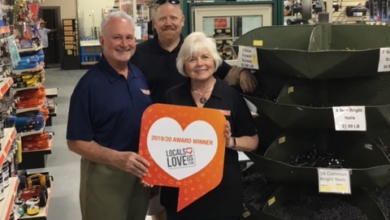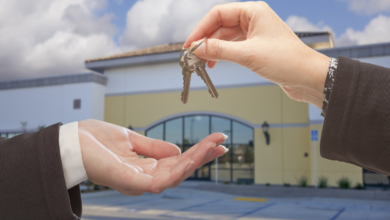Turning Your Website Into a Selling Tool
By Chris Jensen
 Majestic’s Hardware in Gardiner, N.Y., promotes e-commerce sales through Facebook posts.»
Majestic’s Hardware in Gardiner, N.Y., promotes e-commerce sales through Facebook posts.»
The retail arena continues to change rapidly for hardware retailers, as new online competitors spring up while Amazon continues to grow at a rapid pace. If there is one positive thing that has arisen from the pandemic, it is the fact that more independent hardware retailers have come to realize the importance of having a strong online presence. They have used their websites to promote curbside and delivery service and to promote the growing trend toward buy online pickup in store (BOPIS).
Your store’s website needs to do more than provide information about your business in a templated look—it needs to drive revenue. A static website—with minimal information that rarely changes—sends a message to customers that the business is not prepared to meet their needs with 21st century technology.
A new generation of shoppers is starting most shopping trips on their smartphones, and in many cases that is where their shopping will take place. Having an e-commerce site that has been optimized for mobile will help your store stay in the game.
Read on to gain insights into the importance of transforming your website into a selling tool that attracts customers. Retailers such as McLendon Hardware in Washington are promoting buy online pickup in store service.»
Retailers such as McLendon Hardware in Washington are promoting buy online pickup in store service.»
E-Commerce Grows in Importance
E-commerce will grow 40 percent to $839 billion in 2020, according to Digital Commerce 360, giving e-commerce a 21 percent share of total retail sales.
One reason for the continuing growth of online sales is the pandemic, which shut down regular commerce and closed many businesses, although hardware stores and home centers were deemed essential businesses and continued to remain open.
Several recent studies have provided data insights into the growth of e-commerce. For example, one reason for the massive growth in e-commerce is the web sale of grocery items. Although supermarkets remained open, people often choose to buy online and have merchandise delivered, rather than go out to shop. Health concerns were a major factor.
According to Small Business Trends, reporting on data from Ware2Go, a distribution firm, 55 percent of Americans made a purchase at a new online store during the pandemic. The study revealed that 87 percent of all consumers shopped online and 64 percent are replacing weekly shopping trips with online orders.
While much of that shopping will be for the kinds of products not sold by hardware stores and home centers, that enormous shift in buying habits makes it absolutely essential that retailers in the hardlines industry have websites that encourage online sales.
BOPIS, also known as Click and Collect, is already an effective sales technique for many retailers. Experts agree that it needs to be offered by every retailer to ensure long-term survival.
The most successful web retailer, of course, is Amazon, with sales of more than $280 billion. For the third quarter of 2020, revenues were up 37 percent to $96.1 billion. Revenues are forecast to be $112-$121 billion in the fourth quarter. With the pandemic continuing into the fourth quarter and people doing more online buying, there appears to be no end to Amazon’s growth.
A study by eMarketer reported that Amazon’s share of the total e-commerce market was 38 percent. Second place, at 5.8 percent share, was Walmart, America’s biggest retailer with $519 billion in total sales this year. Those two retailers offer many of the products sold by hardware stores and home centers, so independent retailers who don’t offer e-commerce are losing sales to these major online competitors.
Home Depot was ranked number 5 with a market share of 1.9 percent, closely followed by Wayfair, an e-commerce merchant with a 1.3 percent share, putting it in ninth place. If you’re not familiar with their offering, Wayfair’s site shows a very wide range of products that are stocked by the average hardlines store.
According to research conducted among consumers by The Farnsworth Group, an Indiana-based research organization, online purchases have nearly doubled their previous market share.
There were two big reasons for the shift to online purchases. Consumers were worried about their health as the primary reason, but the other main reason was they couldn’t find what they wanted shopping in stores, so they went online, and probably to a non-hardware seller.
One of the other factors retailers need to consider about online purchases is that young people, newly married, for example, are often the ones who engage most often in DIY projects. They also are the ones most comfortable with online ordering, another reason why it is so important for retailers to have a viable website that encourages online ordering, BOPIS and delivery services, as some retailers are beginning to do.
Top Retailer Sites
Unfortunately, too many hardlines retailers still are not using their websites to promote online ordering and BOPIS. Too many still use their sites merely to list the departments and products they sell and/or the services they offer, without stressing the ease of buying online with pickup at the store.
In researching for this article, however, we were able to locate websites from a number of large and small privately owned retailers whose websites do an excellent job of promoting online purchases. Interestingly, their approaches differ widely, so visiting them should provide readers with many ideas that can be adopted to improve their own websites.

Aubuchon Hardware, a family-owned chain of 104 stores operating in New England and New York, has long been ahead of the curve with e-commerce activity. They also have an enviable domain name: hardwarestore.com.
Since Aubuchon Hardware has invested heavily in e-commerce for many years, they were better prepared for the tremendous surge in web traffic and BOPIS orders. “Our web revenue is up 1,500 percent for the year,” said President Will Aubuchon IV. “We’ve launched contactless curbside service, so customers can just check in online when they arrive without calling.”
Aubuchon has partnered with Redpoint Global’s rgOne solution since 2018 to bring all customer data into a comprehensive, single customer view and utilize intelligent orchestration capabilities to deliver personalized, winning campaigns. These tools allowed Aubuchon to meet customers’ e-commerce needs and offer a more personalized BOPIS experience. Having all of its customer data integrated into a single customer experience platform served Aubuchon well during an unexpected surge in growth related to the pandemic.
“Throughout the pandemic, we have been able to communicate with customers quickly and effectively about our curbside pickup service but also customize communications for their specific needs at a scale not possible before,” Aubuchon added.
Lehman Hardware is a large single-unit store catering to Amish customers in Ohio. Its in-store and website inventory includes many non-electric items as well as all the normal hardlines products. Because its inventory is so unique and broad, its online business has become very substantial. It now offers weekly email marketing to a broad mailing list. Check out Lehmans.com.
Busy Beaver is a Pennsylvania-based chain whose home center stores are much smaller than those of Home Depot or Lowe’s, but their inventory does include lumber and building materials, in addition to all the other basic hardware categories. Go to BusyBeaver.com.

Klem’s is a store somewhat like Lehman’s in that its inventory contains many unusual products. It is located in Spencer, Mass. Its home page lists Shop Online as one option. Another element on its site, stressed by some other stores, is to mention its support of local charities and other organizations. Its website is klemsonline.com.
“Online selling is a whole other store with almost as much work involved,” says Jessica Bettencourt, president of Klem’s. “The largest benefit is for our current customer base to see if we have something in stock. We have customers in every day that use our website for reference before they come into the store. Our website is maintained and updated weekly.”
Kenneth Malone of Beaty Hardware in Cleveland, Tenn., is getting a niche established selling tools, knives and closeout items on eBay, which can be viewed here.
Sullivan Hardware and Garden in Indianapolis, Indiana, is a four-store operation with a heavy emphasis on garden products and outdoor living, with a huge inventory of patio furniture. Because it sells so many large, bulky items, its website mentions delivery as well as in-store pickup. The site’s e-commerce function is run through Shopify. See Sullivanhardware.com.
Jim Lehrer of Brownsboro Hardware & Paint in Louisville, Ky., is now emphasizing free curbside pickup or delivery at the top of his website. That is followed below by the online shopping options available through Do it Best along with featured deals, monthly specials and the retailer’s latest circular. Check out brownsborohardware.com.
Advice From Experts
In his book “Crazy-Cheap Marketing,” marketing expert and home center retailer Andy Curry suggests that retailers use videos on their websites. “Videos are engaging, and since they take longer to play than it takes to see an image, people will stay on your website longer. This helps tell Google that your website is more engaging and more desirable than websites where visitors do not stay long. This translates into Google making your website more visible on the internet. Use compelling videos that show the great lengths you go to in order to take care of your customers,” he writes.

Brian Gilbert of Gilbert’s PRO Hardware in St. Clair Shores, Mich., can vouch for that advice. Back in 1996 he had the foresight to buy the rights to the URL mrhardware.com, which has enabled him to establish an online business selling parts and hardware products. He has even been able to monetize his DIY videos, such as one on restringing a weed eater that has garnered more than 3.7 million views on Youtube.
Websites need to complement your overall retail strategy, according to experts. “First, a retailer should think carefully about what it’s good at. A do-it-yourself hardware store is differentiated by how it enables people to take on projects successfully,” says Brian McGlynn, vice president of commerce at Coveo, which provides online personalization software embedded with artificial intelligence.
“Fundamentally, what Amazon has shown is that the customer experience is what matters above all else. When customers find what they want quickly, they buy. When they find something related and useful, they buy more. And when made personal, it satisfies an even greater need: the need for a relevant shopping experience,” McGlynn adds.
Webinar Discussion
Two Beacon Award winners recently participated in an Epicor-sponsored webinar that discussed e-commerce: Earl Van Buskirk of Island Home Center & Lumber in Vashon Island, Wash.; and Leigh Ann Akard of Akard True Value Hardware in Zionsville, Ind.
“When we first started with this (pandemic) we were trying to figure out curbside and how to do the pickup and we literally were using a piece of paper. Customers would call in and it probably took 10 minutes a transaction, because we were trying to figure out what type of dirt they wanted and there was a lot of back and forth. It became an easy decision to invest the money in what it would cost monthly for that e-commerce feature (in our Epicor system) to be turned on. It’s definitely worth it,” Akard says.
She adds, “We had a customer buy a plunger from ship-to-store and it made us wonder. If I need a plunger I’m not ordering online and waiting however long it takes. That’s when we realized the internet was more of a competitor than we thought. When customers buy online and come to the store, we have them walk all the way back to our customer service desk to pick up the item. That way they have to traverse our store.”
Van Buskirk was quick to roll out BOPIS and curbside service when the pandemic hit, and he believes that type of service will stick around. “We’ll never go back to the exact same normal we were at before,” he says. “Moving forward you have to have omni-channel marketing.”
He adds, “The big challenge is to keep your inventory accurate, so when people buy things and go to your store to pick them up you have them. Everyone knows your inventory can get off with shrinkage, but customers get pretty irritated when they come to pick up something that they’ve paid for on the internet and you don’t have it.”
Akard says, “E-commerce is not going to be an overnight success and is quite a big investment. As long as you look at ways you can leverage e-commerce, you can definitely justify that cost. You have to keep building it one step at a time. While we got a nice shot in the arm with online in this current situation, we can’t rest on our laurels and have to keep letting people know we’re here.”

The Hardware Connection is a digital magazine targeted to independent hardware/home improvement retailers. It is the only industry magazine designed and distributed solely in electronic format and currently reaches over 60,000 people in the two-step channel.
The Hardware Connection publishes four Newsletters each year in addition to eight magazine issues.
To sign up yourself or additional staff to a free subscription to receive The Hardware Connection magazine and newsletter in electronic format, please click here.







